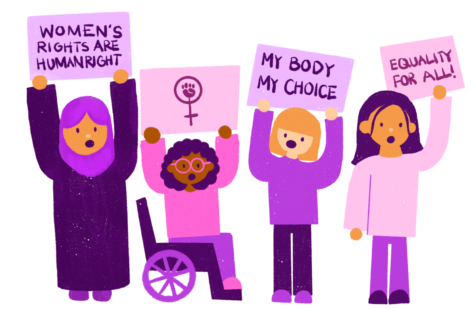
We’ve given women education, jobs in the workforce, suffrage, and started to view them as equals. However, as we progress, we are simultaneously regressing in our journey to become equals across gender and race.
Feminism has become androcentrism. Rather than celebrating women as a whole, feminism has begun to take on a different angle: women who adapt to better align with the societally defined characteristics of men are more celebrated than those who don’t; women who take on more stereotypically masculine careers are applauded more than those who engage in work that displays more stereotypically feminine traits, such as passivity, obedience, and nurturance. A misogynistic societal ideology emerges when any work that demonstrates these characteristics is deemed to be less worthy of praise. Caryl Shepard ’22 describes that “from a woman who will likely enter a humanities field,” despite her passions for this route, “others often perceive it as ‘settling’ for something easier.” Contrasting the praise of “challenging the status quo” when she had originally wished to pursue a STEM major, they seemed to consider a woman entering the humanities field “uneventful and unimportant.” Despite arguments that women in male-dominated fields (like STEM) and male-dominated positions should get more praise for breaking the glass ceiling, we should not pull out individual women to praise while disparaging those who stay at home or take on more stereotypically feminine jobs. The point of feminism is to support and honor the totality of women. When this doesn’t happen, feminism becomes rooted in the postulate of androcentrism.
Girlboss feminism is white feminism. Girlboss feminism, a form of feminism that acclaims women in typically masculine positions, stems from the perspective of white women who are more likely to assume top management spots than women of color. As women of color progress through life with less privilege, they generally have less access to the high level management roles so highly acclaimed by girlboss feminists. According to UCSC, white women account for approximately 7% of CEOs out of the total 7.5% of CEO positions held by women. Alveena Khoday ’23 asserted her desire for more representation within the movement, saying that “a clear sense disconnection often stands between feminism and race when in reality they’re inseparable.” Furthermore, “feminine” jobs are often assumed by people of color, such as nail technicians and hairdressers. Thus, if girlboss feminism doesn’t support people with these occupations, isn’t that targeting the unprivileged races?
The feminist movement stems back approximately 200 years in hopes of evening the balance between women and men. Despite a common belief that feminism started with white women, like Elizabeth Cady Stanton, their ideology was in truth set upon a foundation of Black feminism. Yet through years of struggle, this movement has become white-dominated, where white women can control the campaign, exploit girlboss feminism to promote their self interest, and further this system of capitalism and white supremacy in the name of feminism. A woman in the STEM field should have no more right be the face of a feminist movement than a woman in humanities; a white woman should be no more a feminist representation than a colored woman.
LM, as a school, portrays a degree of inherent girlboss and white feminism. So, how should LM support the members of its community affected by misogyny? The first step towards eradicating the “women in STEM are more valuable” mindset is to promote women in other fields as well. Rather than primarily advocating for students to pursue STEM fields, we should also advocate for more interest in humanities fields. We must acknowledge that women in humanities face sexism just as women in STEM do and equally encourage students to pursue both, but most importantly, we should encourage women to pursue their passions. We must recognize that feminism influences and reflects each person differently, whether it’s because of differing backgrounds or experiences. Therefore, we should encourage people of color to share their journeys and permit students to see representation within the community in all fields.
What should we do as individuals? The simple answer: support all misogyny impacted individuals. The longer answer: support all misogyny impacted individuals equally, view feminism from a wider perspective by listening to the voices of women of color, eliminate the exploitation of feminism, abolish an androcentric feminist ideal. Growing up in an era with this movement on the rise, I’ve personally experienced much of the societal progression, but despite the progress we have gained there is still so far to go. For many people, the execution of feminism didn’t live up to what it could’ve entailed, but we can still change that. We must not put down women for not fitting a feminist model; in fact, there shouldn’t be one ideal to begin with. Feminists are not white female CEOs with short hair, red lipstick, and a haughty attitude. We must ensure that we don’t generalize until that is the one epitome of feminism we are left with. We must be careful of inherent girlboss and white feminism and the fallacies they support. We must equally love and support women as a whole.

